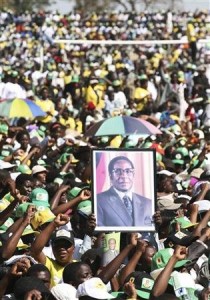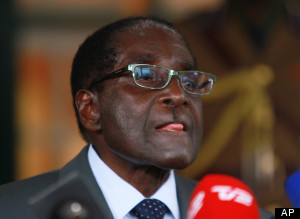Truth be told, the only thing newsworthy about Wednesday’s general elections in Zimbabwe is how peaceful they were.
 It certainly came as no surprise when the state Election Commission announced today that President Robert Mugabe was re-elected with 61 percent of the popular vote over Opposition Leader Morgan Tsvangirai, who garnered only 33.
It certainly came as no surprise when the state Election Commission announced today that President Robert Mugabe was re-elected with 61 percent of the popular vote over Opposition Leader Morgan Tsvangirai, who garnered only 33.
No less significant, though, was the announcement that Mugabe’s ruling ZANU-PF party won 158 of the 210 seats in the House of Assembly, giving it a veto-proof two-thirds majority. For this landslide victory will spare the 89-year old Mugabe the indignity of having to end his presidency for life in the kind of shot-gun political marriage he was forced into in 2008 – after Tsvangirai’s MDC party won 100 seats in general elections. (Of course, this assumes that Mugabe will be either dead or mentally unable at 94 to stand at the next election….)
Mind you, the following quote will attest that I practically arranged this shot-gun marriage as the only means of avoiding a descent into the kind of tribal/sectarian violence that has plagued countries like Iraq and Afghanistan for over a decade, and now seems destined to plague countries like Egypt and Syria for just as long:
Like Kibaki and his ruling party [in Kenya], all indications are that Mugabe and his ruling ZANU-PF party lost close national elections that were held on March 29. Yet, like Kibaki, Mugabe refused to concede defeat, which also plunged Zimbabwe into post-election violence…
[I]t behooves Opposition Leader Morgan Tsvangirai and his Movement for Democratic Change (MDC) to seek a grand compromise for a coalition government based on the Kenyan model. And they would do well to heed this advice because all political and legal maneuvers to oust Mugabe are doomed to fail…
(“Kenya Forms Grand Coalition: A Model for Zimbabwe,” The iPINIONS Journal, April 14, 2008)
Meanwhile, given the complaints about vote rigging and voter suppression, it’s a wonder Mugabe did not end up with 90 percent of the popular vote and his party with three-quarters of the seats.
We are going to go to court, we are going to go to the AU (African Union), we are going to go to the SADC (Southern African Development Community).
This, according to an August 3, 2013 Reuters report, was how Tsvangirai “angrily” announced his plan to challenge the results.
Alas, as credible as all complaints may be, they don’t stand a snowball’s chance in Hell of altering the announced results. Not least because here’s how no less a person than Olusegun Obasanjo, head of the African Union’s election observer group, effectively dismissed them:
I have never seen an election that is perfect. The point has always been and will always be how much are the infractions, imperfections have affected the result of the election being a reflection of the will of the people.
(BBC, August 2, 2013)
The clear implication being that, even if Catholic nuns were in charge of voter registration, election-day monitoring, and vote counting, Mugabe and his ZANU-PF party would still have won. Not to mention that the SADC has already joined with the AU in entreating Tsvangirai and the MDC to accept the results.
I too entreat them to accept.
 I hasten to note, however, that Obasanjo could just as well have been dismissing complaints about the vote rigging and voter suppression that attended last year’s general elections in the United States. But I also agree with him with respect to Zimbabwe because, after 33 years under Mugabe’s iron-fisted rule, a vast majority of Zimbabweans are clearly suffering what can only be diagnosed as a case of mass Stockholm Syndrome. And this must have become even more acute after a majority of them voted for Tsvangirai in 2008 only to see Mugabe treat Tsvangirai just like on of them:
I hasten to note, however, that Obasanjo could just as well have been dismissing complaints about the vote rigging and voter suppression that attended last year’s general elections in the United States. But I also agree with him with respect to Zimbabwe because, after 33 years under Mugabe’s iron-fisted rule, a vast majority of Zimbabweans are clearly suffering what can only be diagnosed as a case of mass Stockholm Syndrome. And this must have become even more acute after a majority of them voted for Tsvangirai in 2008 only to see Mugabe treat Tsvangirai just like on of them:
Mugabe can afford to be magnanimous. Indeed, I suspect he would be happy to confer the title of prime minister upon his politically cuckolded foe, Tsvangirai; provided, however, that that title is conferred with all of the political power wielded by a Nubian Eunuch.
(“Mugabe Swears Himself In as President for Life,” The iPINIONS Journal, June 30, 2008)
Finally, it seems surreal, almost to the point of being laughable, that so many reporters and commentators are speculating about what Mugabe’s re-election portends for Zimbabwe’s bilateral relationship with the United States – specifically in light of sanctions that have been in place since 2003.
After all, the vast majority of these sanctions are “targeted” against the country’s top leaders (i.e., they are intended to affect them personally). More to the point, data from the U.S. Department of The Treasury show that:
- bilateral trade between the United States and Zimbabwe actually doubled between 2003 and 2008 and, after a dip related to the global economic downturn in 2009, showed double-digit growth in 2010;
- notwithstanding sanctions, the United States has given millions in food and other humanitarian aid to Zimbabwe;
- there is no evidence of any macroeconomic effect from U.S. sanctions on Zimbabwe; and
- its economy was floundering long before the United States imposed sanctions because of Mugabe’s shortsighted, nationalistic policies, which included confiscating land from White farmers to give to Black cronies whose only familiarity with “hoes” stemmed from their assignations with high-end prostitutes in Western cities like Paris and London:
Five years ago, there were 4000 white-owned farms in Zimbabwe; today, there are only 400 (mostly unproductive) farms left. Five years ago, Zimbabwe was the breadbasket of sub-Saharan Africa; today, it is a basket case of starving people.
(“Zimbabweans Pray for Liberation from their Liberator,” The iPINIONS Journal, March 29, 2005)
 What’s more, China has demonstrated that it is more than willing and able to not only pick up any slack in this respect, but also do business with Zimbabwe on politically amoral terms (rather like the way the United States does business with China, no?). Not to mention that the EU has already telegraphed its intent to lift its copycat (or lapdog) sanctions on Mugabe and other top officials.
What’s more, China has demonstrated that it is more than willing and able to not only pick up any slack in this respect, but also do business with Zimbabwe on politically amoral terms (rather like the way the United States does business with China, no?). Not to mention that the EU has already telegraphed its intent to lift its copycat (or lapdog) sanctions on Mugabe and other top officials.
We don’t have the right to continue with that if the elections are acceptable… If the outcome of the elections is clear, is accepted, who are we, all Europeans, to say… we continue with our sanctions.
(EU Special Representative Roeland van de Geer, EUBusiness Ltd., July 12, 2013)
This is why all that remains is for the United States to swallow its pride, and lift its sanctions too.
Hail Mugabe….
Related commentaries:
Kenya forms grand coalition: a model for Zimbabwe
Mugabe swears himself in as president for life
* This commentary was originally published yesterday, Saturday, at 10:45 pm